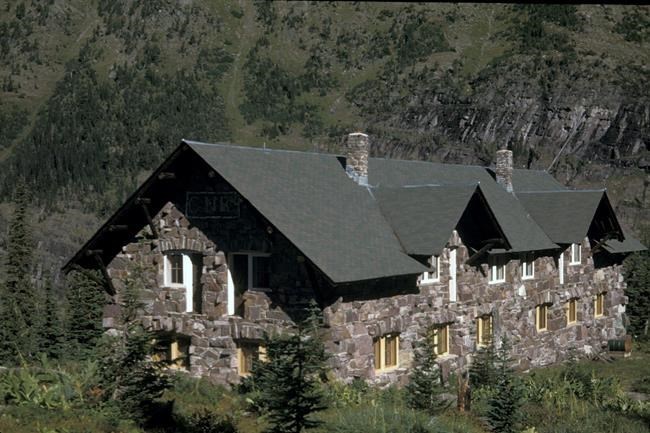
FILE - This undated file photo provided by Glacier National Park/National Park Service shows the Sperry Chalet in Glacier National Park, Mont. The National Park Service has approved plans to rebuild a century-old Montana hikers' dormitory that was destroyed in a fire last year in Glacier National Park. Glacier park spokeswoman Lauren Alley said Thursday, May 17, 2018, that work to reconstruct the Sperry Chalet is expected to begin in July after officials determined this week there would be no significant environmental impact. (Glacier National Park/National Park Service via AP, File)
Republished May 17, 2018 - 5:13 PM
Original Publication Date May 17, 2018 - 1:36 PM
HELENA, Mont. - Rebuilding a Glacier National Park backcountry dormitory that burned in a fire last year may temporarily scatter the mountain goats, grizzly bears and other wildlife that frequent the area, but it won't cause any permanent harm, officials said Thursday.
However, critics of the park service's environmental analysis of the plan to rebuild the Sperry Chalet cast doubts on the study, saying the project is being rushed through by U.S. Interior Department leaders.
The plan approved by the National Park Service calls for using horses, mules and helicopters to haul materials up a mountainside to the site of the Sperry Chalet, which is six miles from the nearest roadway. Construction is expected to last two summers, requiring dozens of pack-line trips and hundreds of helicopter flights, sometimes 40 or 50 flights a day, according to the park service's environmental analysis.
The noise and high traffic volume will likely temporarily displace the Canada lynx, grizzly bears, mountain goats, golden eagles and other wildlife there, according to the analysis. The area also is a migration route for eagles, hawks and other raptors.
Any adverse effects on wildlife — including five animals, plants and insects listed as threatened species — will be temporary and there will be no overall change in the species' population or distribution, according to the document signed by Glacier park Superintendent Jeff Mow and National Park Service Regional Director Sue Masica.
Interior Secretary Ryan Zinke, whose hometown of Whitefish is about 30 miles (48 kilometres) away from Glacier, said in a statement Thursday that rebuilding Sperry Chalet is a priority and he applauded efforts to move the project forward.
Zinke was previously criticized by conservation groups who said he's shown favouritism toward Montana issues that are before his agency and the park service, which is raising entrance fees amid an $11.6 billion maintenance backlog. Other examples include recommending a new national monument near Glacier park and supporting a mining ban north of Yellowstone National Park.
The environmental analysis on the Sperry Chalet rebuild is another example of Zinke's Montana favouritism, Bonnie Rice of the Sierra Club said. The review process was rushed, with an abbreviated public comment period, so it's not really clear what the long-term effects of the project will be on wildlife, she said.
"For something this big, it merits more time and analysis and shouldn't just be rushed through like this," Rice said.
Zinke spokeswoman Heather Swift did not immediately respond to an email requesting comment.
The Sperry Chalet, built in 1914, is one of two stone lodges in Glacier that remain from the days when visitors arrived on the Great Northern Railway to explore the park by horseback, with lodges spaced a day's ride apart. Sperry and Granite Chalet had become beloved icons of the park, prompting high interest in the National Park Service to rebuild.
Last August, a lightning-caused fire damaged the dining hall and destroyed the dormitory. But the stone walls remained standing and will be used in the rebuild.
The construction project will go out to bid with the goal of beginning the first phase in July, Glacier spokeswoman Lauren Alley said. Early estimates put the cost at between $8 million and $12 million, and the costs must be approved by the National Park Service Development Advisory Board, Alley said.
News from © The Associated Press, 2018